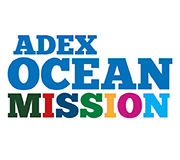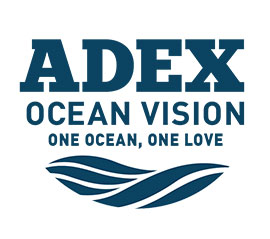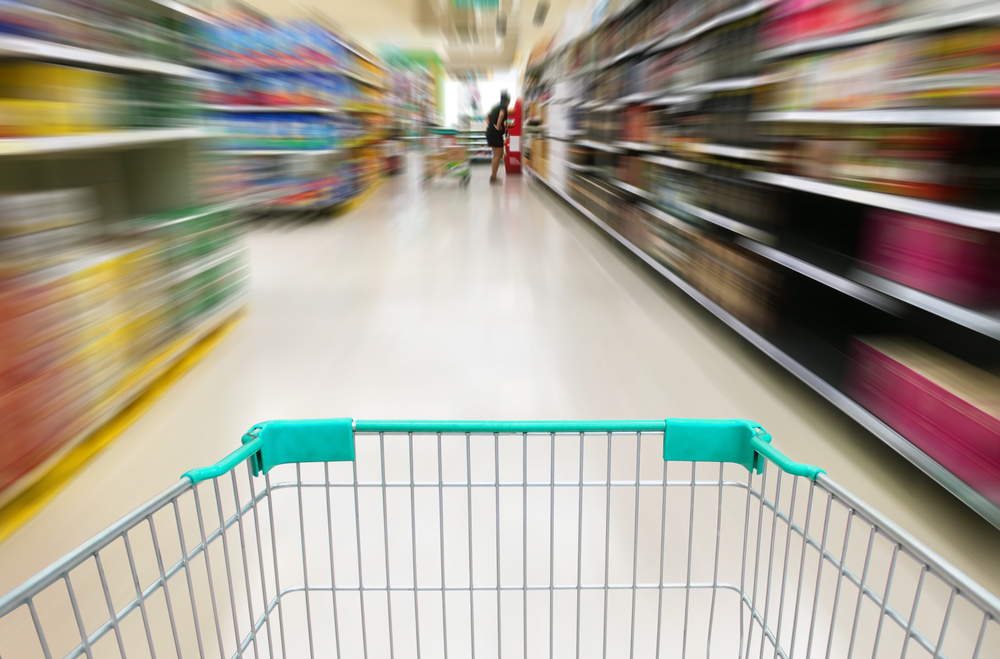Article extracted from Asian Diver Issue 02/2020 (155)
It’s not just on a national level where change is being implemented. Several evolved and active brands have derived, produced or presented products to the world that take on an environmentally friendly angle by promoting sustainability. Let’s celebrate the respective initiatives taken up by commercial brands, non-governmental organisations, non-profit organisations, and social and technical enterprises, as we attempt to capture some of the most unique and memorable ones.
Check out International Brands Against Plastic – Retail & Fashion here!
Check out International Brands Against Plastic – Entertainment here!
FAST-MOVING CONSUMER GOODS
ÉVIAN
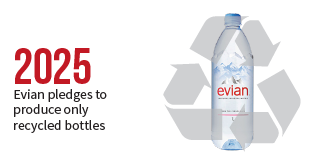 The mineral water bottle company is going carbon neutral and plastic-free. In 2017, they introduced a zero-carbon bottling plant in an attempt to implement major change across the business.
The mineral water bottle company is going carbon neutral and plastic-free. In 2017, they introduced a zero-carbon bottling plant in an attempt to implement major change across the business.
Évian has pledged to produce entirely recycled bottles by 2025. They are attempting to graduate from a linear model to a circular one with the aid of the Ellen MacArthur Foundation. A collaboration with the Veolia waste management company will also ensure that they speed up their rates of recycling and their bottles don’t end up in the ocean.
NESTLÉ
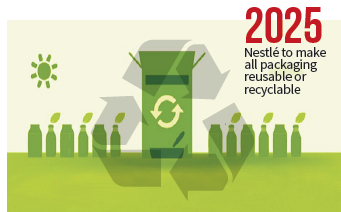 The world’s biggest packaged food company has announced its initiative to make all of its packaging reusable or recyclable by the year 2025. In early 2019, Nestlé engaged in action toward that promise and removed plastic straws from all of its products. The company has a vision where none of its packaging ends up as litter or piled up in landfills. Nestle plans to eventually replace plastic packaging for its chocolate bars with paper packaging. They are also planning to transition the packaging of drinks from plastic to paper containers.
The world’s biggest packaged food company has announced its initiative to make all of its packaging reusable or recyclable by the year 2025. In early 2019, Nestlé engaged in action toward that promise and removed plastic straws from all of its products. The company has a vision where none of its packaging ends up as litter or piled up in landfills. Nestle plans to eventually replace plastic packaging for its chocolate bars with paper packaging. They are also planning to transition the packaging of drinks from plastic to paper containers.
KFC’S PLASTIC PROHIBITION
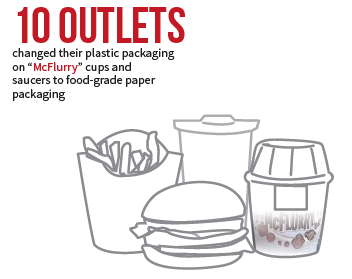
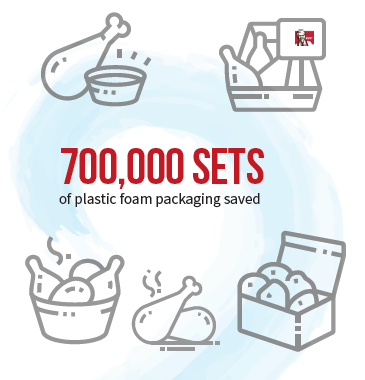 In December 2016, KFC attempted to phase out in-house paper boxes and portioned their meals in reusable baskets instead. In 2017, they changed from foam packaging for their breakfast platters and porridge bowls to recyclable paper ones. These efforts curbed their use of paper boxes and foam packaging in six months by roughly 2.5 million and more than 700,000 sets. From June 2018 onwards, KFC Singapore announced that in order to curb single-use plastics, they will no longer distribute plastic straws and caps with drinks at 84 outlets.
In December 2016, KFC attempted to phase out in-house paper boxes and portioned their meals in reusable baskets instead. In 2017, they changed from foam packaging for their breakfast platters and porridge bowls to recyclable paper ones. These efforts curbed their use of paper boxes and foam packaging in six months by roughly 2.5 million and more than 700,000 sets. From June 2018 onwards, KFC Singapore announced that in order to curb single-use plastics, they will no longer distribute plastic straws and caps with drinks at 84 outlets.
MCDONALD’S
 In September 2019, certain McDonald’s outlets in Singapore stopped using plastic straws and replaced some single-use plastic items with more sustainable alternatives. The effort was a month-long trial to understand consumer sentiments. Ten McDonald’s outlets also changed their plastic packaging on the “McFlurry” cups and saucers to food-grade paper packaging as well as using cutlery and stirrers made from wood materials.
In September 2019, certain McDonald’s outlets in Singapore stopped using plastic straws and replaced some single-use plastic items with more sustainable alternatives. The effort was a month-long trial to understand consumer sentiments. Ten McDonald’s outlets also changed their plastic packaging on the “McFlurry” cups and saucers to food-grade paper packaging as well as using cutlery and stirrers made from wood materials.
A McDonald’s spokesman said there would be no replacement straws offered for now, and that they would monitor consumer response. He said: “During this period, we will monitor the sentiments of our valued customers closely and keep track of its feasibility in Singapore before making the decision to implement this change in all our restaurants islandwide.” The trial is a part of the chain’s attempt to “drive environmentally sustainable practices in our restaurants, including packaging, energy efficiency, waste management, and green restaurant design”.
COCA-COLA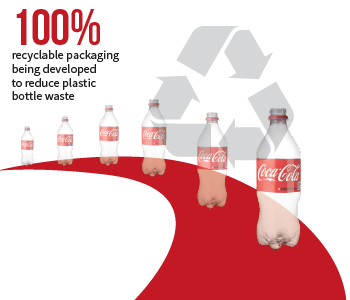
In 2018, the mega-company announced a goal to collect and recycle the equivalent of every bottle or can that they sell by the year 2030. As part of their “World Without Waste” initiative, they are trying to change the system of the packaging life-cycle. Right now they’re focused on developing 100 percent recyclable packaging and mitigating the amount of plastic in their bottles.
CARLSBERG
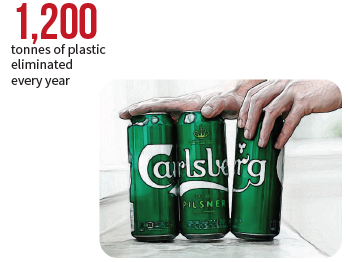 In late 2018, Danish brewer Carlsberg became the first beer producer to eliminate plastic rings from their packs. The company is now using recyclable glue to attach its cans together. By doing so, Carlsberg is eliminating 1,200 tonnes of plastic everyyear – the equivalent of 60 million plastic bags – and decreasing the amount of plastic used in most mainstream multipacks by up to around 76 percent.
In late 2018, Danish brewer Carlsberg became the first beer producer to eliminate plastic rings from their packs. The company is now using recyclable glue to attach its cans together. By doing so, Carlsberg is eliminating 1,200 tonnes of plastic everyyear – the equivalent of 60 million plastic bags – and decreasing the amount of plastic used in most mainstream multipacks by up to around 76 percent.
STARBUCKS
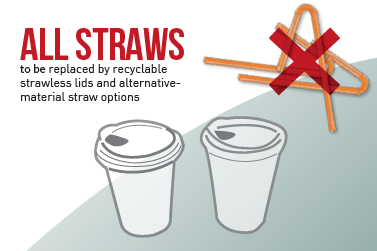
Starbucks is inviting you to enjoy your favourite coffee guilt- and plastic-free by the end of this year as it eliminates plastic straws from all its outlets globally. Single-use plastic straws will be replaced with new recyclable strawless lids and straw options made from alternative materials. While the coffee chain will eliminate a staggering one billion plastic straws annually, the fate of the replacement “recyclable” strawless lids remains in question, given that less than one-tenth of the world’s plastic is recycled.
GUINNESS
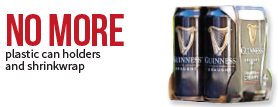 In April 2019, the British beverage company behind the bottling of Guinness, Diageo, announced that they would be ridding all forms of plastic from their Guinness beer packaging and replacing it with entirely biodegradable and or recyclable cardboard materials. The new packaging appeared on shelves in August last year, with the UK and international markets in 2020.
In April 2019, the British beverage company behind the bottling of Guinness, Diageo, announced that they would be ridding all forms of plastic from their Guinness beer packaging and replacing it with entirely biodegradable and or recyclable cardboard materials. The new packaging appeared on shelves in August last year, with the UK and international markets in 2020.
“For 260 years Guinness has played a vital role in the communities around us. We already have one of the most sustainable breweries in the world at St. James’s Gate [in Dublin, Ireland] and we are now leading the way in sustainable packaging,” said Mark Sandys, Global Head of Beer, Baileys, and Smirnoff.
FAIRPRICE
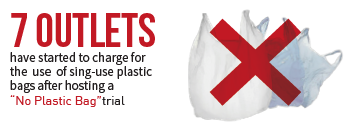 On September 4, Singaporean grocery retailers FairPrice began charging 10 cents and 20 cents for plastic bags at seven different outlets. The seven stores include FairPrice Xtra at Hougang One mall, FairPrice Finest at Zhongshan Park mall, FairPrice at 18 Tai Seng mall, FairPrice Xpress in Lorong Chuan and Cheers outlets at Sengkang Community Hospital and in Create Way and Aljunied Road. Prior to this, they also hosted a “No Plastic Bag” trial that attempted to encourage shoppers to use their own bags.
On September 4, Singaporean grocery retailers FairPrice began charging 10 cents and 20 cents for plastic bags at seven different outlets. The seven stores include FairPrice Xtra at Hougang One mall, FairPrice Finest at Zhongshan Park mall, FairPrice at 18 Tai Seng mall, FairPrice Xpress in Lorong Chuan and Cheers outlets at Sengkang Community Hospital and in Create Way and Aljunied Road. Prior to this, they also hosted a “No Plastic Bag” trial that attempted to encourage shoppers to use their own bags.
Shoppers who want to use plastic bags will have to pay 20 cents for every transaction at FairPrice, FairPrice Finest, and FairPrice Xtra stores. For Cheers and FairPrice Xpress stores, they will be charged 10 cents per transaction. The FairPrice chain will donate the collection of the plastic bag levy to the Singapore Children’s Society and The Straits Times School Pocket Money Fund.
UNILEVER, DOVE
 In October 2019, the pioneering beauty and care essentials brand announced plans to move to 100 percent recycled plastic bottles and plastic-free packaging for its beauty bar by 2020. The company expects the measure to reduce the use of virgin plastic by more than 20,500 tonnes annually. Unilever, Dove’s parent company, has made a promise to be actively involved in creating a “circular plastic economy” in which plastic is reused and recycled.
In October 2019, the pioneering beauty and care essentials brand announced plans to move to 100 percent recycled plastic bottles and plastic-free packaging for its beauty bar by 2020. The company expects the measure to reduce the use of virgin plastic by more than 20,500 tonnes annually. Unilever, Dove’s parent company, has made a promise to be actively involved in creating a “circular plastic economy” in which plastic is reused and recycled.
Liked this post? Stayed tuned for Airlines’ initiatives on mitigating plastic use!
